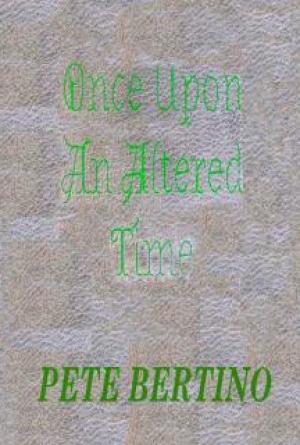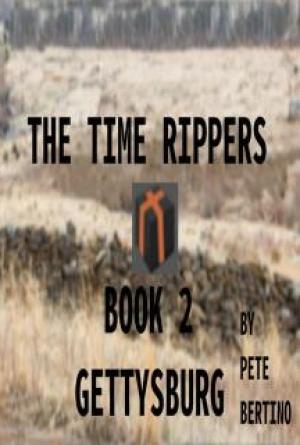EPILOGUE
Fountain water flowed from the mouths of angels. The Seraphim Fountain dominated the Los Angeles city square. Clean, happy citizens stood round, holding containers, reverently waiting for their day’s portion of the new, inexhaustible treasure. Sculpted fountains were being built throughout the rich city; botanical gardens sprang up. On that warm and sunny January weekend, the victorious city gave over to leisure. Serene Sunday walkers strolled through the shade of the well-kept park; on the pavilion stage, a string quartet played Hayden to a small, attentive audience. Families picnicked on orange-and-blue hemp blankets spread across the hard, dirt ground (even in the surfeit of water, grass yards were still forbidden by popular acclaim). Women shopped the endless cornucopia of stalls; men loafed in the sidewalk cafes, playing backgammon and drinking beer. Bicycle-drawn rickshaws floated through the streets, carrying lovers, families, and rich Mexican tourists.
The street bustled with commerce. Stalls sold vegetables, art, antiques, tools, fish, venison, chickens, and rabbits. A vast crowd gathered in front of one stall made of wood and covered by a green hemp awning. This was the bookseller’s stall, and the robust and red-faced septuagenarian proprietor smiled excitedly as, hand over hand, he took cash for his product. A long, unstructured line began to form. The best seller of the season was The Gift Of The General, by B.C. Puglese. Next to the retailer, seated at an eighteenth-century French desk, the esteemed author signed copies of his story of Benharash’s conquest.
Puglese did not look much different than he had during the campaign, cleaner perhaps, but nonetheless disheveled and over-energized. Despite new wealth, he had not gained weight or changed his dress. He was enjoying his new celebrity and tried to fit it by playing the role of the scholar. Indeed, he held out great hope that his account of the liberation of the Aqueduct would catapult his patron Benharash into high civilian office. The historian banked on the idea, with justification and encouragement, that he himself would set policy. The talk in the city-state’s chambers of government was that the ambitious pacifist was a man whose ideas would have to be reckoned with. Inwardly, Puglese’s mind flowered with schemes of polity.
In his book, Puglese had written about Benharash’s engineering and organizational feats as well as his flawless battle and war leadership. In the tome’s final episode, Benharash returned to the fray and, by dint of his planning and execution, the closure of the combat was favorably secured. As stated in the book, the hero’s return was instigated by his view that more men were dying because of his lack of engagement. In short, he entered the war to make way for peace. The book did not mention that since his return to Los Angeles, the general had remained secluded in his mansion, from whence he had chased his wife; that a cruel, morning-to-night depression had swallowed the hero in one large bite.
Nor did the book depict San Francisco in its last hours, a charred wasteland, populated only by women, children, the elderly, and the infirm, cowering in the rubble, stumbling about in shock. Not a building stood. Those made out of wood (as was most of the post-quake reconstruction) had been burned utterly; brick and stucco structures were blown up. The former farmland in Golden Gate Park was salted; the few wells, plugged; the chickens, hogs, and goats were chased through the tunnels and left to wander the peninsula or die in the clutches of the dog packs of the Shambles. Nor did Puglese attempt to describe the miles-long column of San Francisco militiamen marching south, unarmed and heads hanging. ALA straw bosses would herd the defeated army and its woeful dependents across the Peninsula and out into the deserts. The strong would be separated and sent to work along the Aqueduct, and live under armed guard. The survivors would no doubt band together with other brigands. But they would be the weak of a weak army and not a true threat to the vice mayor’s host. All long-term problems were disregarded in the eagerness to return home. Missing, too, from the victor’s account of history was the unknown fate of Thruston and Helen Wentworth. Despite six different men claiming to have killed these last leaders, their bodies were never found and no proof of their deaths could be provided.
A short, pencil-thin woman with long, tightly-curled hair stood at the front of the line. As he smiled and signed his autograph, Puglese said in response to his fan’s comment, “It was a simple matter of right against wrong. In this case, under the wing of a great man, right won out.”
The sticklike woman’s colorless eyes flashed. “Whenever I hear about it, I get so mad! Such vandals! They destroyed our aqueduct not for gain, but for malice.”
Puglese put down his pen and handed her the book back. He put his hand on the twiglike fingers of his fan and said gravely, “Worse villainy than my words can describe. It took more than words to mete out justice to that evil society.” He paused. Then, softer voiced, he went on, “But there’s no reason to worry now.”
Touched by his solicitude, her little eyes watered. She said, “Thanks to men like you.”
Puglese raised his finger and smiled. “Not me, I’m just a recorder. Your prayers should go with General Benharash!”
As Puglese signed, the town square bustled. Opposing flocks of prepubescent children gave every morsel of themselves in a game of soccer; handholding, neck kissing, and shy, youthful smiles were to be seen in every corner of the Spanish-styled arcades facing the square. Even on Sunday, pipe-smoking bald men talked business at small cafe tables.
Irma Isoka, wearing a gossamer blue dress and a broad-brimmed, beribboned black hat, sat at such a cafe table with her husband. The always-uniformed diplomat read the weekly newspaper. He paid particular attention to the theater reviews. With great strength and scant attention, he held across the table Irma’s outstretched hand. Isoka was pleased to feel her calluses fading. Irma watched the fountain. She watched it flow as she fought her own angry tears. Isoka looked up and smiled at her. She smiled back warily. He looked down at his book, then up again. Pointing to Puglese, he said, “Write history and you make history.”
“Assuming,” Irma said, “that no one burns down your libraries. Then history is history.”
Isoka shook his head. He smiled tolerantly, but with a bitter reserve. He had tried all within his power to please his new wife, even going as far as to invite her uncle live with them. “Irma, why do you say such things?”
“It just helps,” she muttered.
Now, as it did everyday, the thought passed over him. Against all odds, despite the horrors of the past, he would dedicate the rest of his life to making his chosen wife glad to live.
#
Children laughed and played around the fountain, which gurgled voluptuously. Swallows swooped for fun across the water-rich city. Mockingbirds, sounding like angry crows, chased cats.
After the conquest, the Mexican government offered to rebuild and provide security for the entire Aqueduct and the Delta. Mexico would consume about eighty percent of the water, and the rest flowed to Los Angeles free of cost. Also, past debts, never before mentioned by the colossal neighbor to the south, were now to be written off, further justifying the large portion of the new water going to the country with the greatest population and an army to requisition from the mere city-state. The stunned Los Angeles Parliament agreed, having no choice at all. In private, the oligarchs grumbled that Mexico had won the peace. In their humiliation, the leaders looked at one another for culprits.
But, by and in large, the citizenry were satisfied: Now they had no duty to protect the Aqueduct, and the need for conscription was obviated. No one hankered to squander, and they saw their water supply as enough.
The oligarchy saw sufficient water for three or four generations of growth. They decided that the fifth generation must devise its own hydro plan.
THE END







